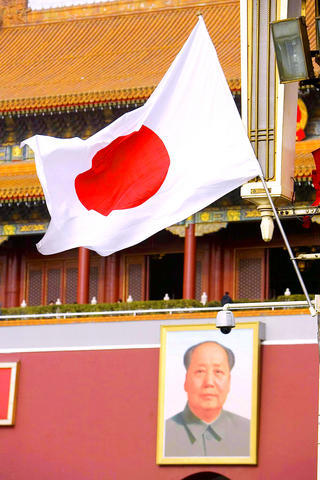Japan urged China to use its growing influence to make an impact on key global issues such as climate change as the visiting Japanese prime minister held summit talks yesterday that reflected warmer ties between the countries.
The two neighbors have a history of animosity stemming from disputes over territory, resources and wartime history, but Japanese Prime Minister Yasuo Fukuda's four-day visit -- his first as prime minister -- follows several friendly meetings between leaders and a Chinese warship's historic port call to Japan.
"In the long history of our relations, there has never been a time when Japan and China has had more influence or responsibilities in Asia and the world," Fukuda said at a joint news conference with Chinese Premier Wen Jiabao (

PHOTO: EPA
Wen also praised the improved bilateral relations.
"Prime Minister Fukuda said the spring has come in our relations and after 2-1/2 hours of talks, I truly feel that the spring of China-Japan relations has indeed arrived," Wen said.
Fukuda was to meet later yesterday with Chinese President Hu Jintao (
"Its significance is truly great," Wen said.
The two sides signed an agreement to promote scientific and technological cooperation to fight climate change.
The agreement calls for Japan to invite 50 young researchers from China every year for the next four years to be trained to combat global warming.
Another agreement called for the launching of a joint project to study and develop magnetic nuclear fission and there was also a memorandum on increasing exchanges between the youth of China and Japan.
Japan is eager to help China tackle pollution that is increasingly felt across the sea in Japan.
"Both sides have consistently believed that, on climate change, pushing forward cooperation is our duty and responsibility in the international community," Fukuda said.
Industries in China are notorious for their inefficiency, requiring more coal or other energy sources to produce the same amount of output as a plant in Japan.
Other topics included a long-running dispute over China and Japan's competing claims to gas reserves in the East China Sea, which both nations hope to exploit to feed their fuel-hungry economies.
"We will continue negotiations and aim for a resolution as quickly as possible," Fukuda said after meeting Wen.
The two also discussed North Korea, a close ally of Beijing, which has been accused of abducting Japanese citizens during the 1970s and 1980s.
"On the kidnapping issue, Premier Wen supports Japan and North Korea resolving this issue through dialogue," Fukuda said.
Japan has also expressed its concern about surging Chinese military spending and wants more transparency from Beijing.
Japanese Foreign Ministry spokesman Mitsuo Sakaba said Japan wished for more military exchanges, but did not answer a question on whether Fukuda had asked to visit any military sites. None was on his itinerary.
Fukuda also spoke at the prestigious Peking University. His remarks were broadcast live on Chinese television.
He visits the industrial port of Tianjin today and will make a stop in Qufu, the birthplace of the ancient philosopher Confucius (

Indonesia and Malaysia have become the first countries to block Grok, the artificial intelligence (AI) chatbot developed by Elon Musk’s xAI, after authorities said it was being misused to generate sexually explicit and nonconsensual images. The moves reflect growing global concern over generative AI tools that can produce realistic images, sound and text, while existing safeguards fail to prevent their abuse. The Grok chatbot, which is accessed through Musk’s social media platform X, has been criticized for generating manipulated images, including depictions of women in bikinis or sexually explicit poses, as well as images involving children. Regulators in the two Southeast Asian

COMMUNIST ALIGNMENT: To Lam wants to combine party chief and state presidency roles, with the decision resting on the election of 200 new party delegates next week Communist Party of Vietnam General Secretary To Lam is seeking to combine his party role with the state presidency, officials said, in a move that would align Vietnam’s political structure more closely to China’s, where President Xi Jinping (習近平) heads the party and state. Next week about 1,600 delegates are to gather in Hanoi to commence a week-long communist party congress, held every five years to select new leaders and set policy goals for the single-party state. Lam, 68, bade for both top positions at a party meeting last month, seeking initial party approval ahead of the congress, three people briefed by

The Chinese Embassy in Manila yesterday said it has filed a diplomatic protest against a Philippine Coast Guard spokesman over a social media post that included cartoonish images of Chinese President Xi Jinping (習近平). Philippine Coast Guard spokesman Jay Tarriela and an embassy official had been trading barbs since last week over issues concerning the disputed South China Sea. The crucial waterway, which Beijing claims historic rights to despite an international ruling that its assertion has no legal basis, has been the site of repeated clashes between Chinese and Philippine vessels. Tarriela’s Facebook post on Wednesday included a photo of him giving a

ICE DISPUTE: The Trump administration has sought to paint Good as a ‘domestic terrorist,’ insisting that the agent who fatally shot her was acting in self-defense Thousands of demonstrators chanting the name of the woman killed by a US federal agent in Minneapolis, Minnesota, took to the city’s streets on Saturday, amid widespread anger at use of force in the immigration crackdown of US President Donald Trump. Organizers said more than 1,000 events were planned across the US under the slogan “ICE, Out for Good” — referring to the US Immigration and Customs Enforcement, which is drawing growing opposition over its execution of Trump’s effort at mass deportations. The slogan is also a reference to Renee Good, the 37-year-old mother shot dead on Wednesday in her